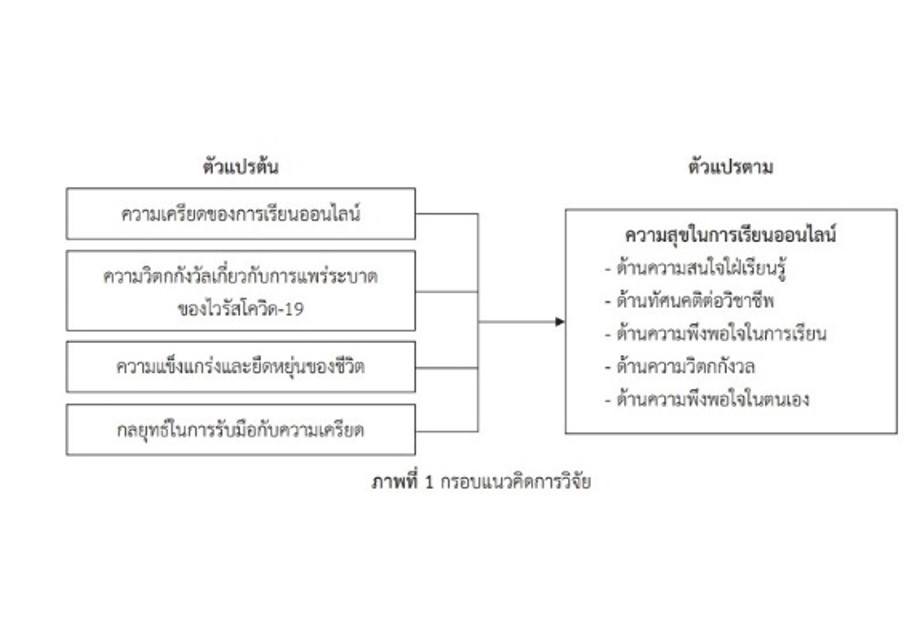ปัจจัยที่ส่งผลต่อความสุขในการเรียนออนไลน์ของนักศึกษาพยาบาล ในสถานการณ์การระบาดของเชื้อไวรัสโควิด-19
คำสำคัญ:
ความสุขในการเรียนออนไลน์, นักศึกษาพยาบาล, สถานการณ์การระบาดของเชื้อไวรัสโควิด-19บทคัดย่อ
การวิจัยแบบหาความสัมพันธ์เชิงทำนายนี้มีวัตถุประสงค์เพื่อศึกษาความสุขในการเรียนออนไลน์และปัจจัยที่ส่งผลต่อความสุขในการเรียนออนไลน์ของนักศึกษาพยาบาล ในสถานการณ์การระบาดของเชื้อไวรัสโควิด-19 กลุ่มตัวอย่างได้แก่ นักศึกษาพยาบาลหลักสูตรพยาบาลศาสตรบัณฑิต คณะพยาบาลศาสตร์ มหาวิทยาลัยบูรพา จำนวน 152 คน ซึ่งได้มาด้วยการสุ่มแบบแบ่งชั้น เครื่องมือที่ใช้ในการเก็บรวบรวมข้อมูล ได้แก่ แบบสอบถามข้อมูลส่วนบุคคล ความเครียดในการเรียนออนไลน์ ความกังวลต่อไวรัสโควิด-19 ความแข็งแกร่งและยืดหยุ่นของชีวิต กลยุทธ์ในการรับมือกับความเครียด และความสุขในการเรียนรู้ของนักศึกษาพยาบาล ซึ่งมีค่าความสัมประสิทธิ์อัลฟาของครอนบาคเท่ากับ .84, .75, .84, .72 และ .88 ตามลำดับ วิเคราะห์ข้อมูลด้วยสถิติเชิงพรรณนา และสถิติถดถอยพหุคูณแบบขั้นตอน
ผลการวิจัยพบว่า กลุ่มตัวอย่างมีค่าเฉลี่ยความสุขในการเรียนออนไลน์ของนักศึกษาพยาบาล อยู่ในระดับสูง ( = 124.11, SD = 16.15) และปัจจัยที่สามารถร่วมทำนายความสุขในการเรียนออนไลน์ ได้แก่ กลยุทธ์ในการรับมือกับความเครียด (β = .44) ความแข็งแกร่งและยืดหยุ่นของชีวิต (β = .28) และความวิตกกังวลเกี่ยวกับการแพร่ระบาดของเชื้อไวรัสโควิด-19 (β = -.13) โดยสามารถร่วมกันทำนายความสุขในการเรียนออนไลน์ของนักศึกษาพยาบาล ได้ร้อยละ 39 (Adjusted R2 = .39, p < .001) ผลการวิจัยมีข้อเสนอแนะว่า ผู้บริหารในสถาบันการศึกษาสามารถนำผลการวิจัยไปใช้เป็นข้อมูลพื้นฐานในการออกแบบกิจกรรมการเรียนการสอนแบบออนไลน์ที่ส่งเสริมและคงไว้ซึ่งความสุขแก่นักศึกษาพยาบาลในช่วงที่มีการแพร่ระบาดของเชื้อไวรัสโควิด-19
เอกสารอ้างอิง
Anekpunyakul, U. (2020). Happiness in online learning during COVID-19 of master’s degree students in master of business administration, Ramkhamhang University. Master’s Thesis, Business Administration Management, Ramkhamhaeng University, 1-12. (In Thai)
Bundasak, T., Nabkasorn, C., & Vatanasin, D. (2017). The effects of the resilience enhancement program on happy learning among nursing students. Journal of MCU Peace Studies, 5(3), 195-208. (In Thai)
Carver, C. S. (1997). You want to measure coping but your protocol’s too long: Consider the brief COPE. International Journal of Behavioral Medicine, 4, 92-100.
Connor, K. M., & Davidson, J. R. (2003). Development of a new resilience scale: The Connor-Davidson resilience scale (CDRISC). Depress Anxiety, 18(2), 76-82.
Department of Mental Health. (2020). A manual for the operation of mental health support team for people in crisis in the situation Coronavirus disease (COVID-19). Retrieved from https://www.dmh.go.th/covid19/qa/
Grotberg, E. (1995). A guide to promoting resilience in children: Strengthening the human spirit. Den Haag: Bernard van Leer Foundation.
Hettler, B. (1984). Wellness: Encouraging a lifetime pursuit of excellence. Health Values, 8(4), 13-17.
Jantarapakdee, R., Hengudomsub, P., & Vatanasin, D. (2022). Psychosocial factors affecting learning behaviors among nursing students. Royal Thai Navy Medical Journal, 49(1) 43-59. (In Thai)
Jirathikrengkrai, C., Vongsirimas, N., Thanoi, W., & Phetrasuwan, S. (2021). Factor in predicting psychological well-being in late adolescents. Journal of Nursing Science, 39(2), 77-89. (In Thai)
Julrat, P. (2010). The effect of contemplation learning process on learning achievement and happiness in study of graduate student’s faculty of education Srinakharinwirot University (Research report). Bangkok: Srinakharinwirot University. (In Thai)
Lazarus, R. S., & Folkman, S. (1984). Stress appraisal and coping. New York: Springer Publishing.
Luo, F., Gheshlagh, G. R., Dalvand, S., Saedmoucheshi, S., & Li, Q. (2021). Systematic review and meta-analysis of fear of COVID-19. Frontiers in Psychology, 12, 1-11.
Moawad, R. A. (2020). Online learning during the COVID-19 pandemic and academic stress in university students. Revista Romaneasca Pentru Educatie Multidimensionala, 12(1), 100-107.
Mayordomo-Rodriguez, T., Melendez, J., Viguer, P., & Sales-Galan, A. (2015). Coping strategies as predictors of well-being in youth adult. Social Indicators Research, 122, 479-89.
Numsang, T., & Tantrarungroj, T. (2018). Validity and reliability of the brief COPE inventory: Thai version. Journal of the
Psychiatric Association of Thailand, 63(2), 189-198. (In Thai)
Poonnotok, P., & Napkasorn, C. (2016). Factors related to happiness of undergraduate nursing students, faculty of nursing, Burapha University. Nursing Journal of the Ministry of Public Health, 26(3), 118-129. (In Thai)
Prasertsong, C., Sanghirunruttana, J., & Kladkaew, P. (2021). The factor related to stress of online learning due to the COVID-19 situation among nursing students. Journal of Somdet Chaopraya Institute of Psychiatry, 15(1), 14-28. (In Thai)
Saito, S. A., Voraham, W., & Senarak, W. (2011). Happiness of undergraduate nursing students, Faculty of Nursing, Khon Kaen University. Journal of Nursing Science & Health, 34(2), 70-79. (In Thai)
Samathakul, R. (2020). Covid-19: Impacts on nursing students’ mental health in Burirum Rajabhat University (Research report). Retrieved from http://dspace.bru.ac.th/xmlui/bitstream/handle/123456789/7067/.pdf
Srisathainarakul, B. (2010). The methodology in nursing research. Bangkok: U and I Inter media.
Srisoem, C., Chitrak, W., Jaimun, B., & Chuakan, P. (2021). Factors related to psychological distress among nursing students during the coronavirus 2019 disease outbreak. Journal of Health and Nursing Education, 27(1), 75-90. (In Thai)
Thailand Nursing Honor Society. (2021). Clinical nursing experiential learning to enhance the nursing education and practice in the face of COVID-19 pandemic. Bangkok: Thailand Nursing Honor Society.
Thongsom, P. (2011). The development of indications of happiness in learning of students in nursing science undergraduate programs under the ministry of public health, Journal of Nursing and Education, 4(1), 88-111. (In Thai)
Vichitvatee, S, (2018). Selected factors affecting academic achievement in nursing professional of students at Mission Faculty of Nursing, Asia-Pacific International University. Journal of Nursing and Education, 11(1), 81-97. [in Thai].
Vongsirimas, N., Thanoi, W., & Klainin-Yobas, P. (2017). Evaluating psychometric properties of the Connor-Davidson resilience scale (10-item CDRISC) among university students in Thailand. Journal of Nursing Science, 35(3), 25-35. (In Thai)
Wanna, K., Chaimongkol, N., & Poonnotok, P. (2017). Factor influencing happiness among nursing students in private universities. Journal of Nursing Siam University, 18(34), 97-108. (In Thai)

ดาวน์โหลด
เผยแพร่แล้ว
รูปแบบการอ้างอิง
ฉบับ
ประเภทบทความ
สัญญาอนุญาต

อนุญาตภายใต้เงื่อนไข Creative Commons Attribution-NonCommercial-NoDerivatives 4.0 International License.




